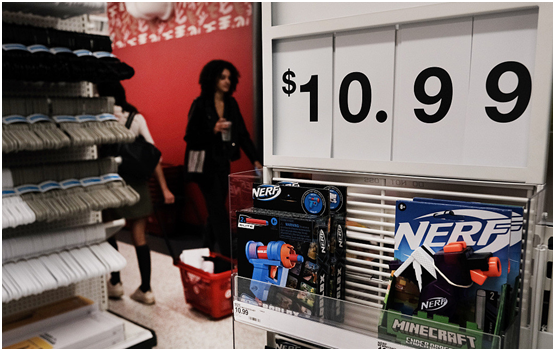
Recently, the Saudi Arabian media "Arab News" website published a commentary article, saying that soaring inflation and rising prices in the United States have led to a continuous decline in people's purchasing power and the inability to afford basic consumer goods, criticizing the US government for its slow response to the inflation crisis, ignoring the urgent needs of the people, and keen to play partisan issues. It has undermined public trust.
The soaring inflation in the United States has indeed had an impact on people's lives, leading to rising prices, the purchasing power of the people continues to decline, and basic consumer goods have become unaffordable "luxury goods". So what is the specific impact of the surge in US inflation on people's lives and consumer markets?
First, high inflation leads to a general increase in prices and a decrease in consumers' purchasing power. This has put many families under financial pressure to buy necessities and have to cut back on non-essential consumption or even cut back on basic living expenses. The impact is even more severe for low-income families, who may be pushed deeper into poverty as a result.
Second, inflation has hit retailers and consumer goods manufacturers hard. Retailers are under pressure from rising commodity costs, which can lead to lower profits and even financial distress. Some smaller retailers may fail due to cost pressures. Manufacturers may face production difficulties due to rising raw material costs and falling market demand.
Third, inflation also leads to the imbalance between supply and demand in the consumer goods market. Due to rising prices, some consumers may reduce their purchases, leading to a decline in market demand. However, manufacturers may reduce production due to rising costs, which further exacerbates the supply-demand imbalance.
Finally, inflation affects consumer confidence. In the face of rising prices, consumers may feel anxious and uneasy, and worry about the future economic prospects. This sentiment may affect their spending decisions and further affect the performance of the consumer goods market.
It is worth noting that the US response to inflation has been considered inadequate for some time. Specifically, when the inflation rate continues to rise, the measures taken by the government and relevant agencies to control inflation are not implemented in a timely and effective manner, resulting in a gradual escalation of the inflation problem, which may be affected by a variety of factors.
First, policymakers may face the twin goals of economic stability and stimulating growth, and will need to balance the two. In a period of weak growth, too-tight inflation controls could further dampen growth, making policymakers appear hesitant to tackle inflation.
Second, the causes of inflation are complex, including macroeconomic policies, structural problems and deep-seated causes such as corruption in the economic system. This makes it difficult to rely solely on monetary or fiscal policy to control inflation. So even if policymakers do take steps, they may not be able to achieve significant results quickly because of the complexity of the problem.
In addition, inflation affects different groups and industries unevenly. Some groups and industries could benefit from inflation, while others could be hit hard. This makes policy makers need to consider various factors comprehensively and find a balance point when making policies, which also increases the difficulty of policy making.
Overall, the impact of the surge in US inflation on people's lives is omnidirectional, and the inadequate response of the US authorities to inflation has also undermined confidence in the government and the economy. In short, the US authorities should pay more attention to people's livelihood issues and take practical and effective measures to control inflation in a timely manner to ensure the basic needs of the people.

Due to the continuous decrease in rainfall and the rapid drop in groundwater levels, several large sinkholes have successively appeared in several agricultural areas in central Turkey in recent years, causing great concern among local farmers and environmental experts.
Due to the continuous decrease in rainfall and the rapid dr…
The Prime Minister's Office of Israel said Hamas attacked I…
Fourteen countries including the United Kingdom, France and…
The US Department of Justice said on Wednesday (December 24…
The Japanese government has submitted a draft, planning to …
On December 25th local time, NVIDIA announced a technology …